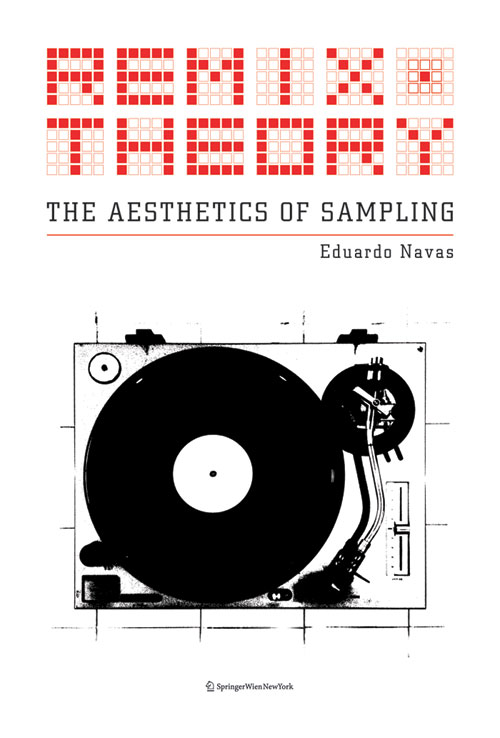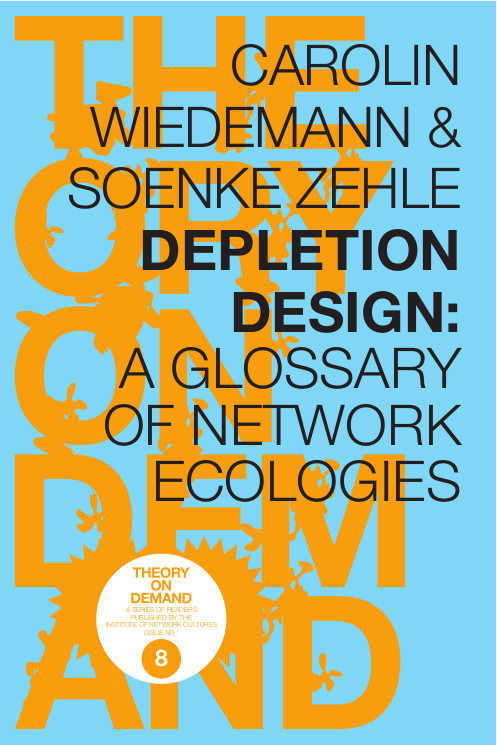Eduardo Navas: Remix Theory: The Aesthetics of Sampling (2012)
Filed under book | Tags: · 1970s, 1980s, mashup, music, music history, music theory, remix, sampling

“Remix Theory: The Aesthetics of Sampling is an analysis of Remix in art, music, and new media. Navas argues that Remix, as a form of discourse, affects culture in ways that go beyond the basic recombination of material. His investigation locates the roots of Remix in early forms of mechanical reproduction, in seven stages, beginning in the nineteenth century with the development of the photo camera and the phonograph, leading to contemporary remix culture. This book places particular emphasis on the rise of Remix in music during the 1970s and ‘80s in relation to art and media at the beginning of the twenty-first Century. Navas argues that Remix is a type of binder, a cultural glue—a virus—that informs and supports contemporary culture.”
Publisher Springer, Vienna, 2012
ISBN 3709112621, 9783709112625
230 pages
RemixTheory.net (from the author)
Publisher
Carolin Wiedemann, Soenke Zehle (eds.): Depletion Design: A Glossary of Network Ecologies (2012)
Filed under book | Tags: · algorithm, anonymous, architecture, biopolitics, commons, creative industries, cyborg, design, ecology, hackerspace, media ecology, network ecology, networks, politics, remix, software, spam, technology, theory

“Depletion Design suggests that ideas of exhaustion cut across cultural, environmentalist, and political idioms and offers ways to explore the emergence of new material assemblages. Soenke Zehle and Carolin Wiedemann discuss Depletion Design with Marie-Luise Angerer, Jennifer Gabrys and David M. Berry, inviting tm13 participants into a collaborative reflection on the necessity to understand human beings as one species among others – constituted by interactions of media, organisms, weather patterns, ecosystems, thought patterns, cities, discourses, fashions, populations, brains, markets, dance nights and bacterial exchanges (Angerer); on the material leftovers of electronics as provocations to think through and rework practices of material politics that may be less exploitative within our natural-cultural relationships (Gabrys); and on lines of flight from and through the computational – about expanding them into new ways of living beyond current limitations and towards new means of judgment and politics (Berry).
We, or so we are told, are running out of time, of time to develop alternatives to a new politics of emergency, as constant crisis has exhausted the means of a politics of representation too slow for the state of exception, too ignorant of the distribution of political agency, too focused on the governability of financial architectures. But new forms of individual and collective agency already emerge, as we learn to live, love, work within the horizon of depletion, to ask what it means to sustain ourselves, each other, again. Of these and other knowledges so created, there can no longer be an encyclopedia; a glossary, perhaps.”
Contributors: Marie-Luise Angerer (Cyborg), Franco ‘Bifo’ Berardi (Exhaustion, Soul Work), David M. Berry (On Terminality), Zach Blas (Queer Darkness), Drew S. Burk (Grey Ecology), Gabriella Coleman (Anonymous), Heidi Rae Cooley (Ecologies of Practice), Sebastian Deterding (Playful Technologies, Persuasive Design), Jennifer Gabrys (Natural History, Salvage), Johannes Grenzfurthner & Frank A. Schneider (Hackerspace), Eric Kluitenberg (Sustainable Immobility), Boyan Manchev (Disorganisation, Persistence), Lev Manovich (Software), Sonia Matos (Wicked Problems), Timothy Morton (Ecology without Nature), Jason W. Moore (Crisis), Anna Munster (Digital Embodiment), Eduardo Navas (Remix[ing] Re/Appropriations), Brett Neilson (Fracking), Sebastian Olma (Biopolitics, Creative Industries, Vitalism), Luciana Parisi (Algorithmic Architecture), Jussi Parikka (Dust Matter), Judith Revel (Common), Ned Rossiter (Dirt Research), Sean Smith (Information Bomb), Hito Steyerl (Spam of the Earth)
Publisher Institute of Network Cultures, Amsterdam, Dec 2012
Theory on Demand series, 8
Creative Commons Attribution-NonCommercial-ShareAlike 3.0 Netherlands License
ISBN 9789081857512
via jussiparikka.net
PDF, PDF (updated on 2015-7-9)
Comment (0)TIM – Teorie Interaktivních Médií, 4: Remake (2012) [Czech]
Filed under magazine | Tags: · appropriation, art, art history, media art, reenactment, remake, remix

“TIM ezin je odborný magazín studentů oboru Teorie interaktivních médií Masarykovy univerzity v Brně. Číslo 4 je věnované tématu REMAKE a také aktuálnímu projektu REMAKE z dílny Sdružení pro aktuální umění a kulturu Atrakt Art.
Projekt, který je založen na kolaborativní produkci a mezinárodní prezentaci nových uměleckých prací, inspirovaných bohatou historií mediálního umění v Evropě, představuje tematické východisko článků druhého čísla ezinu TIM.”
Klíčová slova: remake, remix, remixability, postprodukce, apropriace, znovu provedení (reenactment), koláž, montáž, pastiš, postmodernismus, vizuální kultura, DJ culture, nová historiografie, produsage, prosumer technologies, autorské právo, open source, free software.
Edited by Zuzana Kobíková and Jana Horáková
Publisher Ústav hudební vědy Filozofické fakulty Masarykovy univerzity, Brno
Creative Commons Attribution 3.0 License
ISSN 1805-2606
via Barbora Šedivá
PDF, PDF (updated on 2017-12-2)
PDF articles

